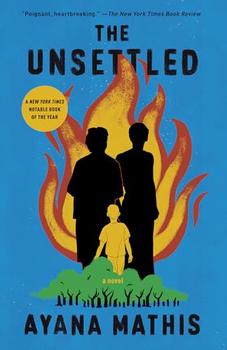Summary | Excerpt | Reading Guide | Reviews | Beyond the book | Read-Alikes | Genres & Themes | Author Bio

A debut of extraordinary distinction: through the trials of one unforgettable family, Ayana Mathis tells the story of the children of the Great Migration, a story of love and bitterness and the promise of a new America.
In 1923, fifteen-year-old Hattie Shepherd flees Georgia and settles in Philadelphia, hoping for a chance at a better life. Instead, she marries a man who will bring her nothing but disappointment and watches helplessly as her firstborn twins succumb to an illness a few pennies could have prevented. Hattie gives birth to nine more children whom she raises with grit and mettle and not an ounce of the tenderness they crave. She vows to prepare them for the calamitous difficulty they are sure to face in their later lives, to meet a world that will not love them, a world that will not be kind. Captured here in twelve luminous narrative threads, their lives tell the story of a mother's monumental courage and the journey of a nation.
Beautiful and devastating, Ayana Mathis's The Twelve Tribes of Hattie is wondrous from first to last - glorious, harrowing, unexpectedly uplifting, and blazing with life. An emotionally transfixing page-turner, a searing portrait of striving in the face of insurmountable adversity, an indelible encounter with the resilience of the human spirit and the driving force of the American dream, Mathis's first novel heralds the arrival of a major new voice in contemporary fiction.
Ayana Mathis's debut novel The Twelve Tribes of Hattie is a stunning, penetrating portrait of a woman through the eyes of her children. Devotion and its intersection with love is one of the central ruminations of the novel. The narrative structure of the novel is intriguing, and somewhat like a puzzle. For example, although Hattie is the titular character, she is rarely allowed the opportunity to provide her own perspective. The effect is powerful and subtle. Each chapter provides information that creates a complete picture of a proud, intelligent, and ultimately, trapped woman. The Twelve Tribes of Hattie establishes Ayana Mathis as a gifted writer, one who will be watched with excitement. Fans of Toni Morrison and James Baldwin will find another favorite in this powerful new talent...continued
Full Review
(785 words)
This review is available to non-members for a limited time. For full access,
become a member today.
(Reviewed by Sarah Sacha Dollacker).
The Great Migration describes a large-scale movement of African-Americans out of the South between 1910 and 1970. Hattie, moving from Georgia to Philadelphia, would have no doubt agreed with Pulitzer Prize-winner Isabel Wilkerson's assessment of the Great Migration as "six million black Southerners moving out of the terror of Jim Crow to an uncertain existence in the North and Midwest."
African Americans began to leave the South shortly after the Emancipation Proclamation was signed, but in small numbers. By the turn of the 20th century, though, segregation, lynchings, and few employment opportunities in the South, forced many blacks to seek their fortunes elsewhere. So many left during this period, in fact, that African-American ...
This "beyond the book" feature is available to non-members for a limited time. Join today for full access.

If you liked The Twelve Tribes of Hattie, try these:

by Ayana Mathis
Published 2024
From the best-selling author of The Twelve Tribes of Hattie, a searing multi-generational novel—set in the 1980s in racially and politically turbulent Philadelphia and in the tiny town of Bonaparte, Alabama—about a mother fighting for her sanity and survival.

The World According to Fannie Davis
by Bridgett M. Davis
Published 2020
A singular memoir that tells the story of one unforgettable mother, her devoted daughter, and the life they lead in the Detroit numbers of the 1960s and 1970s.
I write to add to the beauty that now belongs to me
Click Here to find out who said this, as well as discovering other famous literary quotes!